Solano County Innovations Project
Interdisciplinary Collaboration and Cultural Transformation Model (ICCTM)
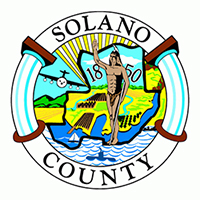
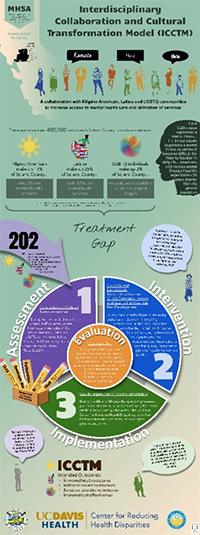
In 2016 Solano County Behavioral Health Division (SCBHD), partnered with UC Davis Center for Reducing Health Disparities (CRHD), to launch a multi-phase five-year community-initiated Mental Health Services Act Innovation project known as the Interdisciplinary Collaboration and Cultural Transformation Model (ICCTM).
The project focuses on highlighting the experiences and mental health needs of the Filipino American, Latino and LGBTQ+ (Lesbian, Gay, Bisexual, Transgender, Queer/Questioning) communities of Solano County.
Traditional approaches used to engage and serve these three communities appropriately have focused mostly on the providers’ skill sets, and community engagement to improve utilization.
This project takes a decidedly collaborative and community-oriented approach to these challenges by creating a training curriculum based on the Culturally and Linguistically Appropriate Services (CLAS) standards - a set of nationally accepted standards for cultural proficiency in service organizations and information gathered directly from the three target communities.
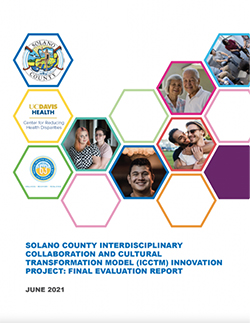
This five year project including education, training, and community based approaches and brought together stakeholders comprised of consumers, community and organizational leaders, advocates, and County and contract staff, to address identified barriers through CLAS-focused quality improvement interventions.
This report summarizes all of the efforts and accomplishments of the project. The report highlights the key components of the project:
- Introduction: overview of the project
- Providing Quality Care with CLAS Training: this section summarized how the intervention training changed participants’ increase in knowledge of CLAS, confidence incorporating a culturally responsive approach in their work, and their engagement behaviors for working alongside members of the Filipino American, Latino, and LGBTQ+ communities.
- Provider Experience: this section showcased levels of job satisfaction among providers who participated in the project and those that did not
- Consumer Experience: this section highlights changes over time of the satisfaction of consumers with their overall services, the cultural responsiveness of the services, the accessibility of the services, and their service outcomes
- Health Outcomes: this section evaluates the impact of the project on access to and timeliness of care and potential contribution of the project on the utilization of outpatient and crisis services
- Economic Evaluation: this section describes the cost analysis done to look at the CLAS Training cots and the overall project cost compared to the health outcomes results
- Community Engagement: this section highlights all the community outreach and engagement efforts done over the project period by our three community-based organization partners
- Sustainability: this section of the report summarizes the quality improvement action plans developed by the project and how the model of this project could be incorporated in future efforts to continue the improvements of the project
- County Insights: includes recommendations from county leaders for other counties or organizations considering similar projects
2019 APHA
The ICCTM Project was selected to be showcase at the 2019 APHA Conference through their video spotlights for its impactful efforts in the community. Check out the inspirational video of our efforts listed below.
2018 APHA
The ICCTM Project was accepted for a roundtable presentation at the 2018 APHA Conference.
¡Lo escuchamos!
Usted habló, ¡lo escuchamos! Únase con nosotros para celebrar el Proyecto de Innovaciones del Condado de Solano, para nuestro tercer foro comunitario. En este foro, usted escuchará a diversos miembros de la comunidad y representantes de agencias del condado de Solano sobre cómo se han utilizado sus comentarios para desarrollar estrategias nuevas a fin de mejorar el acceso y el uso de los servicios de salud mental en el condado de Solano.
Conozca los numerosos planes de mejora de la calidad que se han desarrollado, lo que se ha implementado y lo que vendrá próximamente. Descubra cómo usted puede seguir cambiando las cosas al compartir sus opiniones en apoyo de que el condado de Solano continúe brindando servicios de salud mental que son culturalmente y lingüísticamente adecuados.
You spoke and we listened? This third forum celebrated the Solano County Innovations Project, Interdisciplinary Collaboration and Cultural Transformation Model project. Community members heard from diverse Solano County community members and agency representatives that provided updates on how community feedback has been used to develop actionable strategies to improve access to and use of mental health services in Solano County.
Community members also learned about the many quality improvement plans developed, what has been implemented and what is coming next. Watch the recording to learn how you can continue to make a difference by sharing your voice in support of Solano County continuing to provide culturally and linguistically appropriate mental health services.
See below for two examples of ICCTM quality improvement action plan deliverables from the Solano Innovations Project.
TRUEcare Roadmap
The TRUEcare Roadmap action plan team created a community friendly resource for core basic services a community member may need like behavioral health services, basic needs, crisis, and more. The group worked closely with a graphic designer to create map with images that represent Solano County as well as our diverse communities.
The LGBTQ+ Ethnic Visibility
The LGBTQ+ Ethnic Visibility quality improvement action plan focused on the intersect of the Filipinx and Latinx communities with the LGBTQ+ community to create an anti-stigma signage campaign. The action plan group held focus groups and meetings with Filipinx LGBTQ+ and Latinx LGBTQ+ community members to inform the visuals and the language. Seven (7) posters were developed, and over 450 posters have been distributed to Solano County community locations: restaurants, stores, businesses the Latinx and Filipinx communities frequent, mental health and health care clinics, school wellness centers, and community based organizations.
Solano County is currently developing posters for the African American and Native American LGBTQ+ communities as well.
Sana Alam Mo Bakla | I hope you know Queer is Love
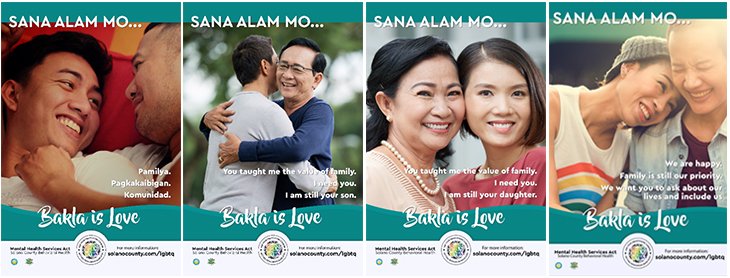
Somos Uno Mas Fuertes Juntos | We are One and Stronger Together
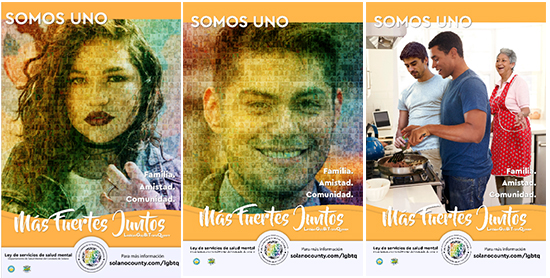
Prior to starting the Solano County Interdisciplinary Collaboration and Cultural Transformation Model (ICCTM) project, a short video was created to highlight the need to take on such a project.
A unique collaboration between a school of medicine and a county mental health services department to improve access to services among three underserved populations: Filipino, Latino and LGBTQ.
Project Goals and Outcomes
Multi-Level Outcomes
On an individual level, the intervention participants would increase their knowledge, experience, and self-confidence in using Culturally and Linguistically Appropriate Services (CLAS) standards.
On a community level, the following outcomes would be evident:
- increase in community outreach and community engagement;
- increase community partnerships across the county;
- improve awareness of mental health services; and
- proven innovative strategies that decrease stigma of mental health in their respective communities.
On a county (systemic) level, outcomes include:
- (1) improve access and utilization of mental health services for Filipino American, Latino and LGBTQ+ communities;
- (2) enhance collaborative partnerships between County, Community, and Community Based Organizations (CBOs);
- (3) increase workforce diversity; and
- (4) improve organizational policies, programs and support systems to ensure and sustain culturally and linguistically competency in service delivery
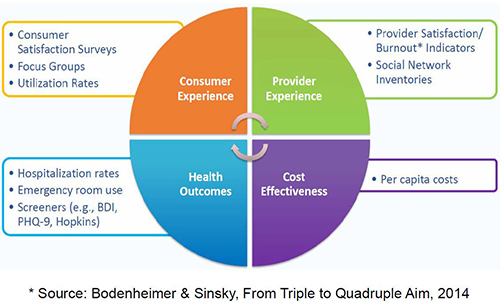
“Quadruple Aim” Framework
This project is grounded in the Quadruple Aim framework — to-date the most effective evaluation model in healthcare — to measure the impact that the ICCTM will have on Filipino American, Latino, and LGBTQ+ mental health consumers in Solano County. 2014-2016 baseline data was used to assess change in access and utilization over time.
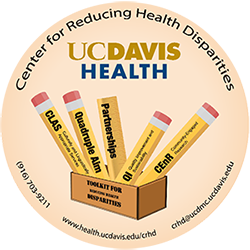
Community-Engaged Research (CEnR) – A framework that is used to increase our understanding of mental health disparities associated with race, ethnicity, gender, sexual orientation, current gender identity, and socio-economic status, and Toolkit for Reducing Health Disparities to increase community engagement to achieve mental health equity and increase access to care (Minkler & Wallerstein, 2008).
Culturally and Linguistically Appropriate Services (CLAS) standards – CLAS standards are designed to ensure that mental health consumers can access, utilize, and benefit from mental health services in the context of their language, race, ethnicity or other personal characteristics (Hollinger-Smith, 2016).
Quality Improvement (QI) and Sustainability – A focus on systematic and continuous actions that lead to measurable improvement in mental health services and the health status of targeted patient groups that sustain over time.
General project phases listed below provide an example of how this cultural transformation project may be adapted to fit your organization's needs.
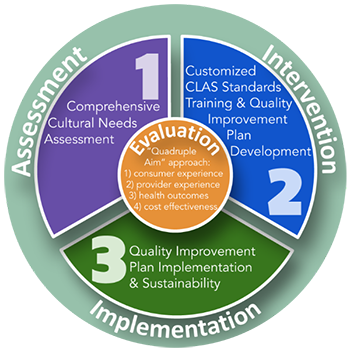
Phase 1 (Years 1-2): Comprehensive cultural health assessment
Collect stories, histories and strengths of the Latino, Filipino American, and LGBTQ communities, Solano County, and community-based organizations (CBOs) and build on them.
Phase 2 (Years 2-3): CLAS training and quality improvement (QI) plan development
Develop a CLAS leadership and program development training specific to the health and mental health needs of Solano County and use this transformational knowledge as foundation for quality improvement (QI) plans.
Phase 3 (Years 4-5): Quality improvement plan implementation
Coordinate and implement Quality Improvement plans with coaching from a team from the Center for Reducing Health Disparities and feedback from the community to accomplish positive outcomes.
Evaluation (Years 1-5): Quadruple aim and sustainable community engagement
Evaluate joint QI plans using a “Quadruple Aim” mixed-methods (qualitative and quantitative) approach that will examine: consumer experience, provider experience, health outcomes, and cost effectiveness.
Providing Quality Care with CLAS Training Curriculum
The ICCTM is the first community-initiated project that combines CLAS with community-informed recommendations through a tailored curriculum.
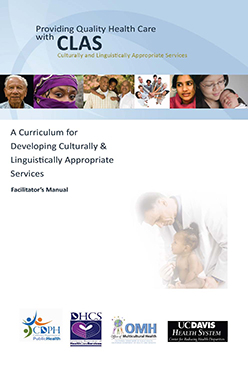
The training consisted of four in-depth training sessions:
- Session 1: Overview/Health Disparities
- Session 2: Community Needs/Gaps*
- Session 3: CLAS Standards
- Session 4: Quality Improvement Action Plan Development
*In Phase 1, CRHD collected hundreds of stories using qualitative research methods and spoke with a range of Filipino American, Latino, and LGBTQ+ individuals regarding the current state of mental health care and access in Solano County. Interviewees from SCBHD staff include both those, working regularly with community-based organizations providing services to each of the three priority communities and their consumers, and shared important insights into the larger context of mental health care service delivery in Solano County. The findings of these community needs/gaps guided the training and ultimately the quality improvement action plan development.
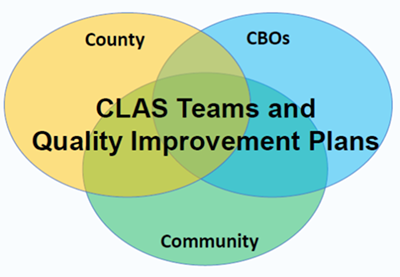
Training Model Cover page of workbook for Providing Quality Care with CLAS
Inter-sectorial: Participants were selected from (1) SCBHD (2) Community Based Organizations (3) social services (4) schools (5) faith-based organizations (6) law enforcement (7) housing, (8) public health.
Multi-stakeholders: Participants were selected from County, CBOs, and the Community. They included: (1) quality improvement staff members; (2) mental health providers; (3) community and county leaders; and (4) consumers and their family members.
Multi-Cohorts: Three cohorts were trained. Each cohort created 3-4 teams, each team created one quality improvement action plan, grounded in the community-defined challenges and community-defined solutions findings from Phase 1 efforts.
Qualitative Approach: Purposive sampling was used to ensure that we obtained a diverse sample of Filipino American, Latino, and LGBTQ+ individuals. To ensure a wide range of perspectives, interviewees included community members from the three priority communities with various community roles. Based on this data, the four key priorities to improve access and utilization of care are:
- Cultural Communication
- Culture and Community
- Workforce Education and Training
- Systemic/Societal Determinants of Health
Community Narrative Reports: Based on the qualitative data collected in 2016, a set of community specific narrative reports were created that summarized experiences shared by each of the three priority communities in describing their access and utilization of mental health care services in Solano County.
Each report gives an overview of the community, outlines their mental health priorities, highlights barriers to accessing and receiving quality services, identifies their particular strengths and assets, and showcases their community-defined strategies and solutions to improve mental health service delivery in Solano County.
Narratives
Filipino-American Voices: Community Narratives about Mental Health in Solano County
- Filipino-American Voices – English (PDF)
- Filipino-American Voices – Tagalog (PDF)
- Filipino-American Voices – Spanish (PDF)
Latino Voices: Community Narratives about Mental Health in Solano County
LGBTQ Voices: Community Narratives about Mental Health in Solano County
Countywide Community Engagement:
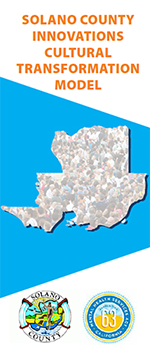
The current project’s scope encompasses seven major cities in Solano County; Benicia, Dixon, Fairfield, Rio Vista, Suisun City, Vacaville, and Vallejo.
We partnered with three Solano County Community Based Organizations (CBOs), each with expertise working with one or more of the three priority communities. These CBOs’, in collaboration with Solano County are identifying individuals throughout the seven cities in need of mental health services and connecting them to treatment. Each CBO created a three-year workplan with specific community-identified strategies to help achieve project outcomes at the community level.
- Solano County Innovations Cultural Transformation Model (ICCTM) – English (PDF)
- Solano County Innovations Cultural Transformation Model (ICCTM) – Spanish (PDF)
Outreach/Engagement Efforts:
Filipino American Community:

Fighting Back Partnership created the Filipinx Mental Health Initiative (FMHI)-Solano. FMHI-Solano is a community-driven coalition which aspires to provide mental health access that is culturally responsive and meets the needs for the intergenerational Filipinx community. The mission of FMHI-Solano is to empower the Filipinx community by providing early intervention through education and access to resources leading to a resilient community.
Latino Community:

Rio Vista CARE (Caring Actions Reaching Everyone) is partnering with organizations that celebrate Latino cultural events throughout Solano County to encourage community engagement opportunities to discuss Latino culture/identity/history as a strategy for mental health prevention and to promote wellness. Rio Vista, CARE is also partnering with clinical providers to coordinate CLAS ready support groups for the Spanish-speaking Latino community in Solano County.
LGBTQ+ Community:
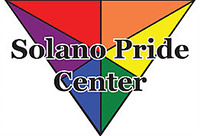
Solano Pride Center, in partnership with faith-based organizations is creating a sense of community and safe spaces for the LGBTQ+ population around mental health and well-being. Specific to LGBTQ+ youth of color, Solano Pride Center is developing peer support groups for parents to discuss risk factors associated with mental illness such as, stigma, discrimination, and isolation, while promoting culture, inclusivity, and mental health wellness.
Intersect of the Filipino American, Latino, and LGBTQ+ Communities:
Our three CBO partners joint efforts to create a Queer and Trans People of Color (QTPOC) initiative. This initiative is helping develop, promote, and coordinate a space specifically for people of color that identify in the LGBTQ+ spectrum where they can safely discuss issues affecting them and the impact those have on their wellness. This initiative will also help connect them to culturally and linguistically appreciate services.
Ten (10) quality improvement action plans were developed through this ICCTM project and fall into three areas of focus:
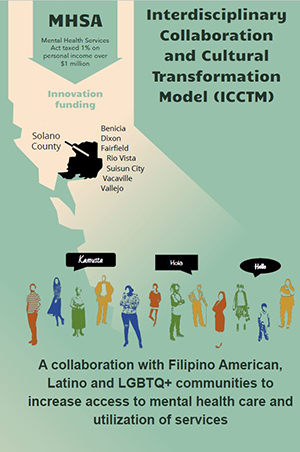
Community-focused: action plans containing recommendations prioritized in a way that helps SCBHD build better relationships with consumers, Community Based Organizations, and other organizations throughout Solano County. These action plans are geared to increasing mental health promotion and wellness by means of many different venues and strategies.
Workforce-focused: action plans containing recommendations prioritized to help build a more diverse workforce within SCBHD and also to help better prepare the SCBHD workforce in “providing quality care with CLAS.” The recommendations in these action plans are geared to transcend HR policy changes, and to accommodate numerous career pathways, and to promote systemic workforce involvement with the Culturally and Linguistically Appropriate Services (CLAS) Standards.
Training-focused: action plans prioritized in a way that helps better train staff members for working with the three priority communities (with the hope to better prepare them for working with any diverse community).
